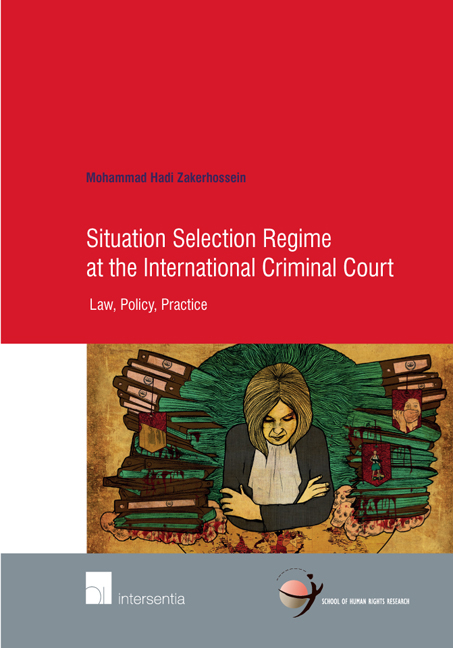Book contents
- Frontmatter
- Contents
- Acknowledgment
- Abbreviations
- General Introduction
- Part One Formulating the Concept of Situation in the Rome Statute Sense
- Part two Situation Selection Process
- Part three Situation Selection Criteria
- Chapter I Jurisdiction
- Chapter II Admissibility
- Chapter III Interests of Justice
- Part Four Situation Selection In Light Of Expressivism
- Conclusion
- Bibliography
- ICC Case Tables
- OTP Documents
- About the Author
- School of Human Rights Research Series
Chapter III - Interests of Justice
from Part three - Situation Selection Criteria
Published online by Cambridge University Press: 13 October 2018
- Frontmatter
- Contents
- Acknowledgment
- Abbreviations
- General Introduction
- Part One Formulating the Concept of Situation in the Rome Statute Sense
- Part two Situation Selection Process
- Part three Situation Selection Criteria
- Chapter I Jurisdiction
- Chapter II Admissibility
- Chapter III Interests of Justice
- Part Four Situation Selection In Light Of Expressivism
- Conclusion
- Bibliography
- ICC Case Tables
- OTP Documents
- About the Author
- School of Human Rights Research Series
Summary
Upon declaring a situation admissible and available for conducting an effective investigation, the Prosecutor approaches the end of the preliminary examination. However, it is not yet the end of the road of the situation selection. The last criterion that should be taken into account before the Prosecutor decides to select a situation is the interests of justice presumption. Article 53(1)(c) of the Rome Statute obliges the Prosecutor to consider whether “taking into account the gravity of the crime and the interests of victims, there are nonetheless substantial reasons to believe that an investigation would not serve the interests of justice.” Introducing the interests of justice notion provides the Prosecutor with “an enormous scope for what amounts to a highly discretionary determination.” The Prosecutorial discretion is not limited to select a specific situation, but it includes her discretion to reject other situations. Therefore, the judgment of the ICC as legitimate and credible depends also on the lack of its Prosecutor's discretion to initiate an investigation. The interests of justice presumption under Article 53 has some remarkable features that make this concept unique in the situation selection process. The Prosecutor of the Court holds that the issue of the interests of justice represents “one of the most complex aspects of the treaty.” The current chapter closes the substantive part of studying the situation selection by shedding light on the meaning and effects of the interests of justice concept in the Rome Statute. The interests of justice presumption is, however, applicable to the case selection process too. A case is selected for prosecution if its selection does not have any countervailing effects on the interests of justice.
In this Chapter, the interest of justice presumption as a factor that plays a prominent role in the situation selection regime will be discussed to provide a better understanding of this notion.
EXCEPTIONALITY OF THE INTERESTS OF JUSTICE REQUIREMENT
The OTP has designed four phases in the preliminary examination. Phase 1, according to the OTP Policy Paper on preliminary Examinations, aims at preventing those situations which are manifestly outside of the Court's jurisdiction to be examined. Phase 2 entails assessing the jurisdiction of the Court. Phase 3 examines the admissibility requirement. The last phase deals with the statutory requirement of the interests of justice.
- Type
- Chapter
- Information
- Situation Selection Regime at the International Criminal CourtLaw, Policy, Practice, pp. 333 - 368Publisher: IntersentiaPrint publication year: 2017



